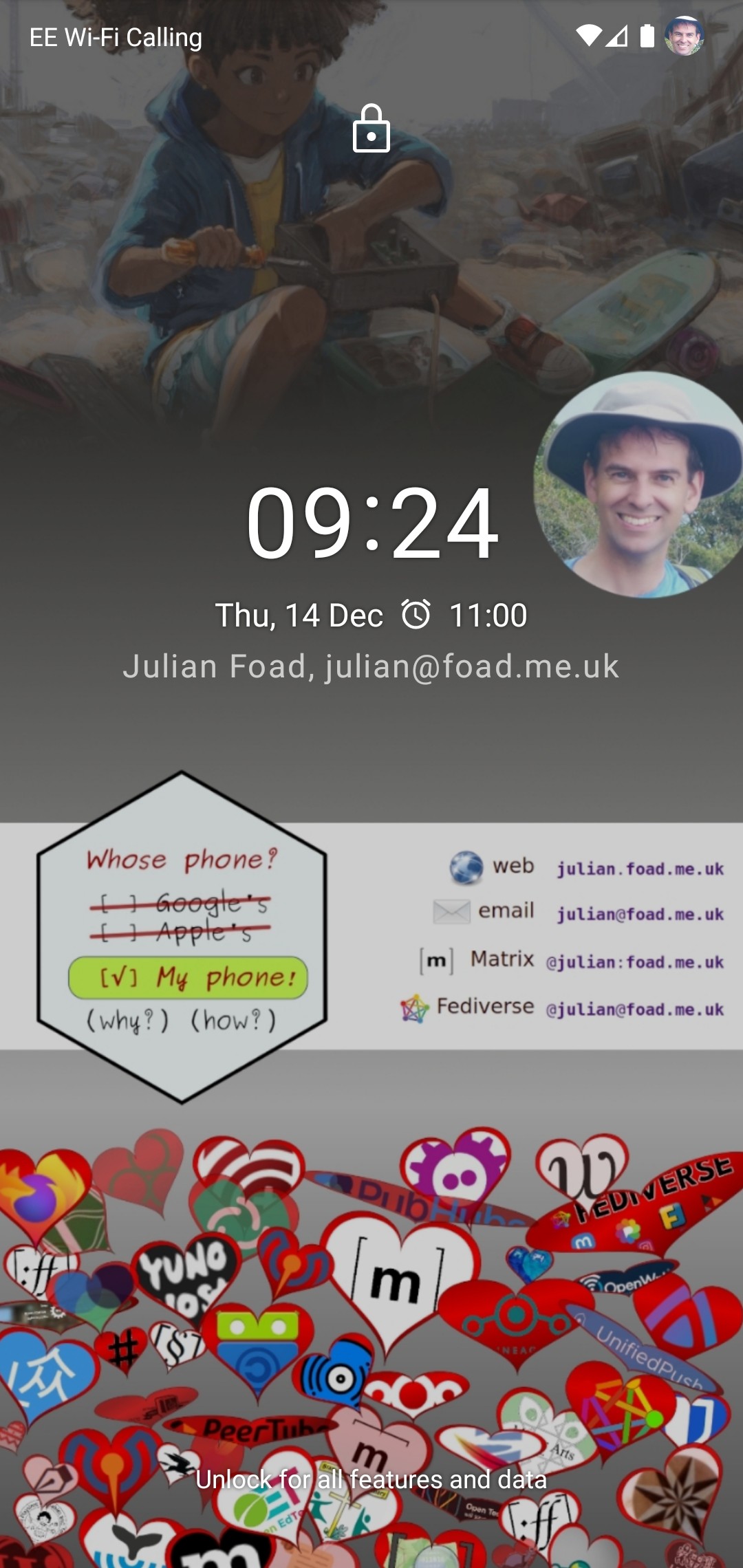Fun with PineTime Smart Watch
As I wrote before, My smart watch is open source. Awesome!

Let's make this fun — for children in particular — and show how we can bend the device to our will because FOSS means it's truly ours, fully under our control.
As I wrote before, My smart watch is open source. Awesome!

Let's make this fun — for children in particular — and show how we can bend the device to our will because FOSS means it's truly ours, fully under our control.

As if I didn't have enough else to do with my evening, I spent it making this. Why?
Are you asking yourself,
“What's it to be: Android or iPhone?”
Actually, NO! There is another way.
Time I Learned: there are freedom-respecting phones.
I'll tell you which one you need.



What's so bad about choosing either Google or Apple?
It's about who controls our use of the device after we “bought” it. Do “they” remain in control of what we do, or are we in control?
![]()
Android or iPhone — either Google or Apple delivers our messages — surely? You don't accept that?
Time I Learned: there are freedom-respecting phones.
People who do not want to depend on Google or have them control our devices are using android-compatible but not google-controlled phones, a.k.a. “degoogled phones”. We have been asking (ourselves) for several years if we can have google-free push notifications. Thanks to the developers of the UnifiedPush standard, the answer is now, “yes!”
But why?
![]()
UnifiedPush open-standard push messaging complements degoogled android-compatible phone OS's such as LineageOS.
People who do not want to depend on Google or have them control our devices are using android-compatible but not google-controlled phones, a.k.a. “degoogled phones”. We have been asking (ourselves) for several years if we can have google-free push notifications. Thanks to the developers of the UnifiedPush standard, the answer is now, “yes!”
The open standard UnifiedPush.org has now been created. While not a large number yet, a useful handful of apps already support UnifiedPush, including several matrix and fediverse apps. For its servers and the associated client-side “distributor” component, there are multiple successful implementations deployed.
This article opens with the well known idea of using (free/libre/open) tech for teaching (free/libre/open) tech skills, but it is not about that, at least not directly.
We tend to think of Google Search as the gold standard, the comprehensive, personalised, convenient, quick and reliable option. The one for getting things done. The experience that other search engines can only aspire to.
But, as we know, Google Search is designed around the financial goals of the advertising business. Can we understand just how far that misaligned incentive has warped the whole experience? What if a search experience were designed in a different way, around what's good for us, what's important to us, our real values? I don't mean just the same kind of search experience but with adverts stripped out. I mean if the whole system, from content publishing through to browsers and apps, were redesigned. How unimaginably different might that look? And as we obviously can't jump straight to that world, what insights does this give us about improvements we could seek in our current world?
Robin Berjon explains in “Fixing Search”. It's a good article. (@robin@mastodon.social">Follow this writer!)
Anyone still thinking Google Search is “good”, after learning about what is going on behind the scenes, is missing a perspective on what “good for us” would really look like.
“Have you ever wondered why every cooking recipe on the web has a twenty page biopic preamble? Because Google likes it better that way.”
Nice campaign page! Fedigov.EU
Federated communication for public authorities
Communicate confidently and respectfully with the public
Congratulations to GNU/Linux.ch and FSFE-CH for this initiative! I love what you're doing here. I think maybe I want to get involved.
I'm a FLOSS dev and thinker, and recently blogged about how we need to be doing exactly this kind of campaign. I'm delighted that you are! Though I'm no PR expert I have some ideas. In my Social Media Links for A People-Centred Community, the messaging I made up begins,
School communities are begging Google to continue supporting Chromebooks beyond the scheduled end date this year. I wish them success with their short term goal. However, I wish more dearly that they would have an opportunity to learn about the down sides of corporate involvement in education, and about ethical alternatives.
Whichever way the petition goes, the media focus there will on Google pushing their Big Tech, likely framed as “generosity”, which we recognise as an anti-pattern. It would be good if we could avoid wasting our energy engaging directly with this news story but instead, riding the wave of it, promote our own story.
Could we write a story something like this?
Having placed all of their eggs in Google's gift basket of once shiny Chromebooks, now rusting away, some schools react by begging the Big Tech for an extension. Meanwhile the [Codename: Ed Foundation?] is preparing to show school leaders a more wholesome future aligned with educational values, with the launch of *[Codename: Ed Suite?]*
You! You, university! You, sports club! You, local library, city council, school, church, youth group! Your social media links could look like this:
Join us in our own spaces! — [Mastodon] – [Pixelfed] – [Friendica] – [PeerTube] ...
— [Blog] – [Fediverse] – [Matrix] ...
We are also on commercial media: — [G] [A] [F] [A] [M] ...
with an explanatory footnote or pop-up: